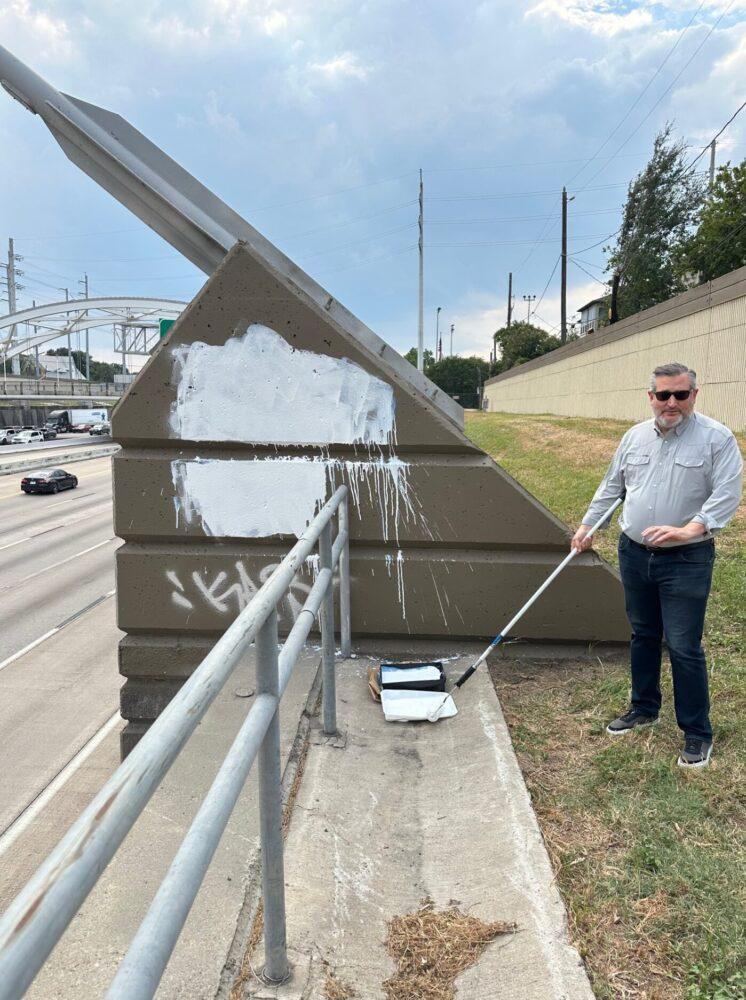Senator Ted Cruz Intervenes to Erase Political Graffiti Targeting Charlie Kirk in Houston
In an unexpected demonstration of hands-on leadership, Texas Senator Ted Cruz personally removed graffiti defacing a downtown Houston wall that disparaged conservative activist Charlie Kirk. The vandalism, discovered in early April 2024 near Houston’s bustling Main Street corridor, featured inflammatory slogans aimed at Kirk’s political stance. By arriving at the site with paint and supplies to cover the offensive artwork himself, Cruz sent a clear message of solidarity and a call for respectful public discourse amid rising political tensions.
Following Cruz’s intervention, Houston law enforcement intensified patrols and surveillance in the area to deter further acts of vandalism. Community leaders have lauded the senator’s proactive approach, emphasizing the importance of fostering constructive conversations rather than destructive expressions. This episode not only reflects the charged political atmosphere in Houston but also highlights ongoing efforts to protect public spaces from hate-driven defacement.
- Incident Date: April 2024
- Location: Downtown Houston, near Main Street
- Senator’s Response: Personally painted over graffiti
- Law Enforcement Action: Increased patrols and monitoring
| Individual | Role | Action Taken |
|---|---|---|
| Ted Cruz | U.S. Senator | Erased graffiti personally |
| Charlie Kirk | Conservative Activist | Subject of graffiti |
| Houston Police Department | Law Enforcement | Enhanced patrols and surveillance |
Community Feedback and the Broader Impact on Houston
The community’s response to the graffiti and Senator Cruz’s direct involvement has been varied yet largely supportive. Many residents applauded Cruz’s initiative, viewing it as a strong stand against vandalism and a reinforcement of community values. One local resident commented, “It’s encouraging to see a public official take immediate action to uphold respect in our neighborhoods.” Conversely, some voices pointed out that the incident reveals deeper political rifts within Houston’s urban environment.
City officials have reported a rise in requests for expanded surveillance and community outreach programs aimed at preventing similar incidents. The event has sparked important conversations around:
- Graffiti’s role as a political statement
- Collective responsibility in safeguarding public spaces
- The involvement of elected representatives in local disputes
| Community Sentiment | Percentage |
|---|---|
| Support for Cruz’s intervention | 62% |
| Concerns about escalating political tensions | 28% |
| Preference for apolitical cleanup efforts | 10% |
Understanding the Political Undercurrents Behind the Graffiti Incident
The episode involving Senator Cruz and Charlie Kirk’s targeted graffiti exemplifies the heightened polarization permeating Texas politics today. The vandalism transcends simple property damage, symbolizing entrenched ideological conflicts that manifest visibly in public arenas. This clash between grassroots activism and established political figures transforms urban spaces into arenas for cultural and policy disputes.
Several factors contribute to the motivations behind such politically charged vandalism:
- Emerging Youth Movements: Younger generations increasingly challenge conservative ideologies, often using public art to voice dissent against figures like Kirk.
- Media Influence: Intense media scrutiny and social media amplification escalate public focus on political personalities, fueling polarized reactions.
- Symbolic Protest Methods: Graffiti acts as a direct, unfiltered form of protest that captures attention swiftly, circumventing traditional political discourse.
| Contributing Factor | Effect on Political Environment |
|---|---|
| Youth Activism | Strengthens grassroots opposition |
| Media Narratives | Amplifies public scrutiny |
| Symbolic Acts | Raises awareness rapidly |
Strategies for Managing Political Vandalism in Urban Areas
Addressing politically motivated vandalism requires a comprehensive strategy that balances prevention with the promotion of respectful civic engagement. Strengthening community-police collaborations to enhance surveillance can deter vandalism while safeguarding free speech rights. Educational initiatives aimed at fostering political literacy and civil dialogue are essential to reducing antagonism and destructive expressions of dissent. Additionally, urban planners and local authorities might explore establishing designated zones for political expression, providing activists with legitimate platforms to voice their views.
Clear and swift restoration protocols are vital to discourage repeat offenses by maintaining the integrity and appearance of public spaces. The following framework outlines recommended actions and responsible parties:
| Recommended Action | Responsible Entity | Implementation Timeline |
|---|---|---|
| Prompt graffiti removal | Municipal Maintenance Crews | Within 24 hours |
| Facilitation of community dialogue forums | Local NGOs and City Officials | Monthly |
| Legal assessment of vandalism incidents | Law Enforcement Agencies | Within 48 hours |
| Development of sanctioned expression areas | Urban Planning Departments | Ongoing |
- Community involvement over strict enforcement: Encourage residents to take ownership in preserving shared environments.
- Balanced policies: Maintain public aesthetics while upholding democratic freedoms.
- Rapid intervention: Limit the visibility and impact of politically motivated vandalism.
Final Thoughts
The recent incident in Houston, where Senator Ted Cruz personally removed graffiti targeting conservative commentator Charlie Kirk, has ignited important discussions about political expression and public dissent. This event highlights the persistent divisions within the political landscape and illustrates how public figures are increasingly engaging directly with their communities. As reactions continue to unfold, the dialogue surrounding political activism, respect for public spaces, and community cohesion will undoubtedly evolve in the days ahead.




